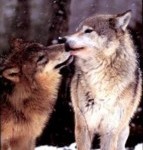Byline: Maja Czarnecka
 SINCE wolf hunting was banned in Poland more than six years ago, the lives of many livestock rearers in this southeastern town have "turned into a nightmare".
SINCE wolf hunting was banned in Poland more than six years ago, the lives of many livestock rearers in this southeastern town have "turned into a nightmare"."Last year, wolves took 26 of our sheep," Grazyna and Antoni Dydak told AFP at their farm in the Bieszczady hills, tucked away in an unspoilt corner of the central European country.
In the summer, when Grazyna takes her 150-head herd of sheep out to pasture, she carries with her fireworks, binoculars and whistles, along with the traditional shepherd's staff and two sheepdogs. But even that is not enough to deter the wolves from attacking.
"Wolves have become really brazen," she said.
"A wolf comes out in broad daylight and you can blow whistles, throw fireworks, stomp your feet ... he might back off at first but then he comes right back. And the wolf always attacks our prize animals," she said.
Even "a hunter with his gun in his hand doesn't discourage the wolf. Man has stopped being the wolf's most feared enemy", said Tadeusz Zajac, a forest guard in Lutowiska.
"It's Brigitte Bardot's fault," said Grazyna, chain-smoking to try to channel her agitation. "She's protesting in France while we pay the price."
Under pressure from the French film star turned animal rights patron, and environmental groups, Poland banned wolf hunting in 1998. In Ukraine and Slovakia, both of which border the Bieszczady region, wolf hunting is still authorised.
"The Ukrainians have no pity for wolves," said Zajac. "They even hunt pregnant she-wolves."
Even when wolf hunting was allowed in Poland, it was only authorised under very strict rules with a tight quota of 20 wolves per year.
"But the hunters killed only three to five a year, maximum seven, because hunting wolf is very difficult," said Zajac.
Wolf hunting was also the economic heartbeat of the secluded and preserved region in southeastern Poland. "Germans, French, Austrians were all prepared to pay good money to come and hunt here."
In the 25,000sq km expanse that Zajac has kept watch over for the past 30 years, there are four or five packs of wolves, each with 10 wolves.
"Their numbers haven't increased much in eight years but they have migrated further west, where there haven't been any wolves for a long time," he said.
Poland's wolf population is estimated at around 800, 250 of which live in the hills of Bieszczady.
In the winter, when sheep are brought in from pasture, the wolves attack dogs. Thirty dogs were killed last year in wolf attacks, according to statistics tallied by the regional government in Rzeszow.
Last year, 587 attacks were recorded, versus 38 in 1999, the year after the ban on wolf hunting took effect. The government last year paid out €87,000 ($143) in damages for attacks by wolves against less than one-quarter of that amount - €12,000 ($20,000) - in 1999.
Livestock farmers lost 1000 sheep in 2004 - 10 times more than five years earlier - not to mention 33 cows, 35 goats and 10 horses.
And the wolves now even attack animals larger than they are. "A pregnant cow was savaged in the autumn by a pack. The veterinarian was unable to save either the cow or her calf," said Antoni Dydak.
The government pays out 500 zlotys ($205) in damages for each sheep lost to wolves.
"That hardly covers half the loss," said Stanislaw Kuczyna, head of an association of sheep rearers.
"Bieszczady is neither Paris nor Warsaw. People here have no other way to make a living."
According to Kuczyna, the number of sheep farms in the region has plummeted in 10 years - a 30 per cent fall because of the wolf. As a direct result, the local abattoir at Lesko only operates at 15 per cent of capacity and sheep are imported from Romania.
"We are perfectly aware of the problem," said Stefan Jakimiuk, an ecologist with WWF Poland.
"But reducing the number of wolves should be a last resort. We should instead teach farmers to protect their livestock, pay for electric fences or equip them with small red triangular flags which ward off wolves."
"Fence off all of Bieszczady? That's sheer madness," said Dydak, who has himself put up a two-metre high fence around his farm.
"In an ideal world, we'd allow hunting to resume. If noone helps us, we'll poison the wolves ourselves with cyanide," his wife warned.



